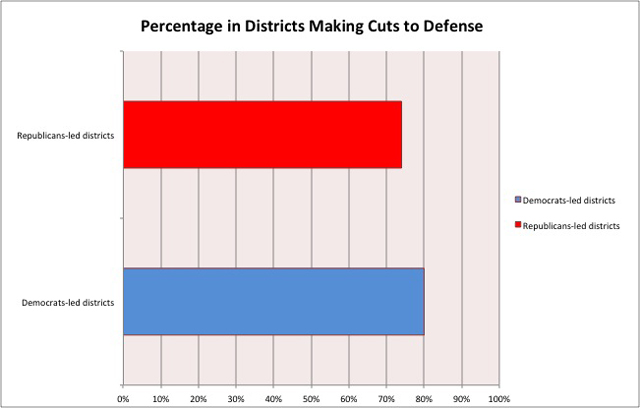WASHINGTON – Most Americans, regardless of political affiliation, favor a slimmer U.S. military, a new survey has found.
Cutting defense spending was welcomed by 80 percent of those who live in Democrat-led districts while and 74 percent of those in Republicans-led districts, the survey showed.
Even many people who live in districts benefiting the most from defense spending supported trimming Pentagon spending, found the web-survey by the Stimson Center joint-conducted with the Program for Public Consultation and the Center for Public Integrity in April.
“There is an idea in Washington now that Democrats favor defense cuts and Republicans don’t,” said Matthew Leatherman, an analyst at the Stimson Center, “That hasn’t been substantiated by the evidence to the best of my knowledge.” Given the fiscal year 2012 defense budget, which was broken into nine major areas based on military services, 665 adult participants in the survey agreed that eight of the nine areas need cuts in the future.
Traditional forces have become much less popular among most participants, who favored 23 percent cuts on the ground force, 17 percent on the Air Force and 13 percent on the Navy, according to the survey. Participants also favored cutting military health care benefits by $7 billion on average.
In contrast, a majority of participants wanted a bigger budget for special operations forces, convinced that they “provide a less expensive, rapid and more precise way” to tackle today’s challenges. Leatherman said while he was “pleasantly surprised” that many participants were able to distinguish the different areas in the given budget-cut scenario.
With wars in the Middle East costing the U.S. trillions of dollars, President Barack Obama promised to bring U.S. troops home by 2014 while the Pentagon proposed a 23-percent cut to its next fiscal-year budget, from $115 billion to $89 billion. The survey showed many Americans want to go deeper, with most participants expecting a much lower figure of $53 billion.
Republican presidential candidate Mitt Romney has proposed increasing defense spending by 17 percent in 2013.
Survey conductors argued that though the survey is purely non-partisan, its results are sending a strong message to Washington – Americans are demanding a more aggressive strategy to reign in military spending.
“Policy makers are moving on the right track with respect to people’s preferences,” said Leatherman, “but they are doing so too tentatively.”
With sequestration likely cutting an additional $500 billion in the Pentagon’s budget, Secretary of Defense Leon Panetta and congressional Armed Services officials are fighting to avoid the ax.
Leaders from four major defense contractors, including Lockheed Martin Corp., will testify on Wednesday before the House Armed Services Committee about the perils of the automatic budget cuts known as sequestration.
Without offering any predictions on the outcome of sequestration, Leatherman said he is confident that the nation will eventually find ways to trim its defense budget.
“It’s just a matter of time,” he said.

